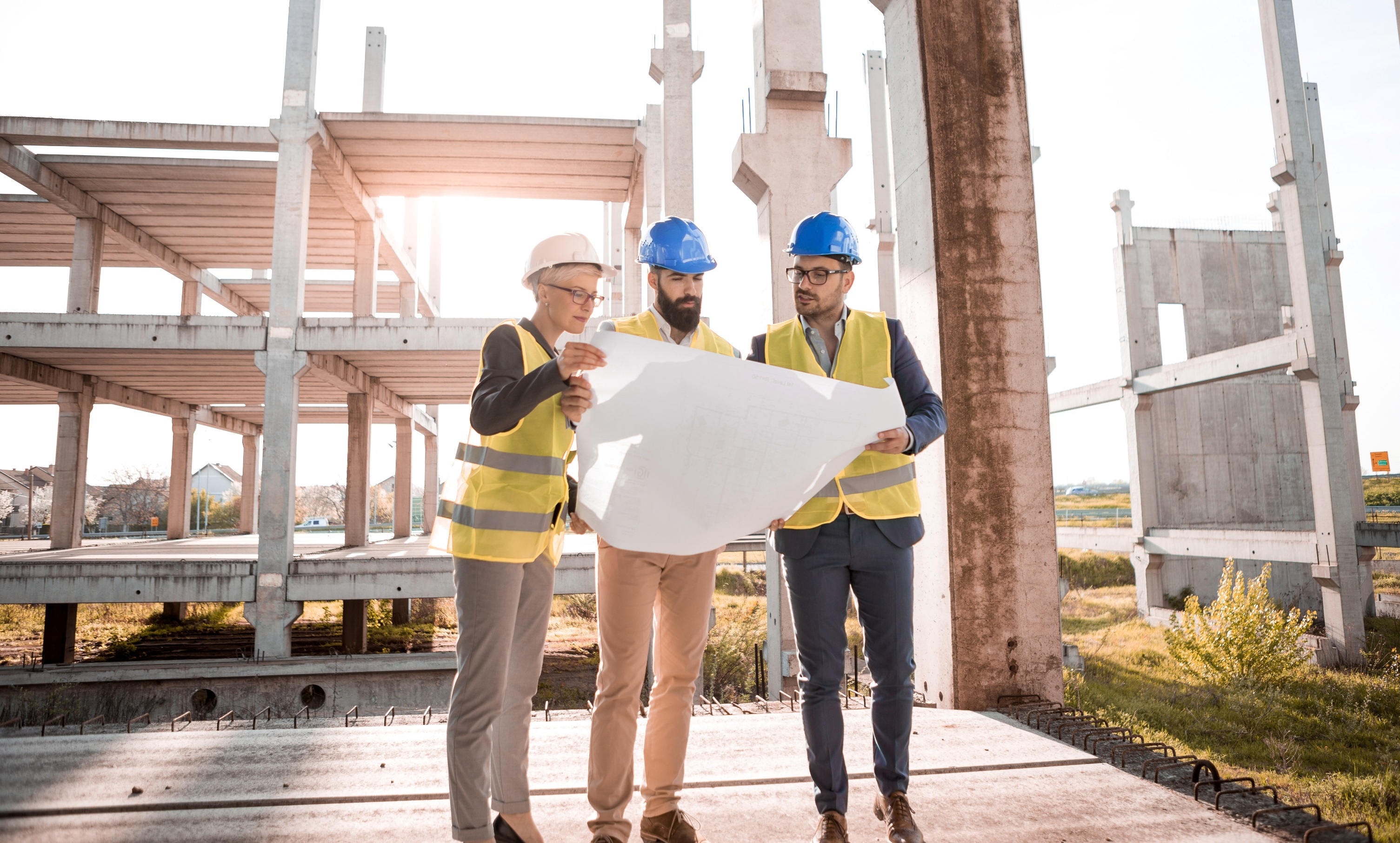Home Construction Loans
Minimum Loan Amount
Minimum Tenure
Minimum Age
Maximum Loan Amount
Maximum Tenure
Maximum Age
Calculate Home Construction Loan EMI
Benefits Of Home Construction Loans
Financing for construction
Home construction loans provide the necessary funds to finance the construction of a new home from the ground up. This includes covering the costs of materials, labor, permits, and other construction-related expenses.
Customisation options
Borrowers have the flexibility to customize their homes according to their preferences and requirements since they have control over the construction process. This allows for personalized design choices and the inclusion of specific features or amenities.
Tailored loan amounts
Home construction loans are typically tailored to meet the specific requirements of the construction project, ensuring that borrowers have access to adequate funds to complete their home-building projects.
Potential cost savings
Building a home from scratch can sometimes be more cost-effective than purchasing an existing property, especially if the borrower can manage the construction process efficiently and negotiate favorable pricing with contractors and suppliers.
Opportunity to build in desired locations
Building a home allows homeowners to choose the location and neighborhood that best suits their preferences and lifestyle. This can be particularly advantageous for individuals who want to live in areas where existing homes may be scarce or not meet their criteria.
Interest-only payments during construction
Many lenders offer the option of making interest-only payments during the construction phase of the loan. This helps to manage cash flow during the construction period when homeowners may not yet be able to move into the property or generate rental income.
Equity buildup
As the home is constructed, the homeowner builds equity in the property, which can be beneficial in the long run. This equity can be leveraged for future borrowing needs or can contribute to the homeowner’s overall net worth.
Ownership of a brand-new home
Perhaps the most significant benefit is that borrowers end up with a brand-new home constructed to their specifications, providing a sense of pride, satisfaction, and long-term enjoyment for themselves and their families.
Flexible disbursement
Home construction loans often have flexible disbursement schedules, allowing borrowers to access funds as needed at various stages of the construction process. This ensures that funds are available when required to pay for construction milestones or expenses.
Tax benefits
Home construction loans may offer tax benefits similar to those available for home loans used to purchase existing properties. Borrowers may be eligible to claim deductions on both the principal repayment and the interest paid on the loan under applicable tax laws.
Myths and facts of Home Construction Loan
Myth: Home construction loans are only for wealthy individuals.
Fact: Home construction loans are available to a wide range of individuals, including middle-income families and even first-time home builders. These loans cater to those who want to build their dream homes but may not have the entire construction cost upfront.
Myth: Home construction loans are more complicated than traditional home loans.
Fact: While the process of obtaining a home construction loan may involve additional steps compared to purchasing an existing home, it is not necessarily more complicated. With proper planning and guidance from the lender, borrowers can navigate the process smoothly.
Myth: You need to own land outright to get a construction loan.
Fact: While owning land outright can simplify the process, it is not always a requirement for obtaining a home construction loan. Many lenders offer combined land purchase and construction loans, allowing borrowers to finance both aspects of the project simultaneously.
Myth: Construction loans have higher interest rates than traditional home loans.
Fact: While interest rates on construction loans may be slightly higher than those on traditional home loans, they are often comparable. Additionally, construction loan interest rates can be locked in for the duration of the construction period, providing borrowers with predictability and stability.
Myth: You need a large down payment for a construction loan.
Fact: While a down payment is typically required for a construction loan, it is not necessarily larger than what is required for a traditional home loan. Down payment requirements may vary depending on factors such as the lender’s policies, the borrower’s creditworthiness, and the loan amount.
Myth: You must hire an architect and contractor before applying for a construction loan.
Fact: While having plans and estimates from an architect and contractor can strengthen your loan application, it is not always a prerequisite for obtaining a construction loan. Many lenders offer pre-approval based on preliminary information, allowing borrowers to finalize plans and contractors after securing financing.
Myth: Construction loans are only for building custom-designed homes.
Fact: While construction loans are commonly used for custom-designed homes, they can also be used for spec homes (homes built without a specific buyer in mind) or semi-custom homes (homes based on pre-designed plans with customizable features). The key is that the home is being constructed rather than purchased.
Myth: You need perfect credit to qualify for a construction loan.
Fact: While having good credit can improve your chances of qualifying for a construction loan and securing favorable terms, it is not necessarily a requirement. Many lenders offer construction loans to borrowers with varying credit profiles, although terms and interest rates may differ accordingly.
-
Do research and compare lenders: Take the time to research different lenders offering home construction loans in India. Compare interest rates, fees, loan terms, and customer reviews to find a reputable lender offering favorable terms.
-
Do determine your budget: Calculate the total cost of your construction project, including land purchase (if applicable), construction expenses, permits, taxes, and contingency funds. Establishing a realistic budget will help you determine the loan amount you need.
-
Do understand the loan terms: Thoroughly review and understand the terms and conditions of the home construction loan, including interest rates, repayment schedule, disbursement process, and any penalties or fees associated with early repayment or delays.
-
Do work with experienced professionals: Hire experienced architects, engineers, and contractors who have a track record of successfully completing home construction projects. Working with professionals can help ensure quality construction and adherence to timelines and budgets.
-
Do obtain necessary permits and approvals: Obtain all necessary permits and approvals from local authorities before starting construction to avoid delays or legal issues. This includes building permits, environmental clearances, and approvals from relevant government agencies.
-
Do maintain clear communication with the lender: Stay in regular communication with your lender throughout the construction process. Provide updates on project milestones, budgetary changes, and any unexpected challenges that may arise.
-
Do keep records and documentation: Keep detailed records of all financial transactions, construction expenses, receipts, contracts, and correspondence related to the project. Organized documentation will help streamline the loan disbursement process and facilitate auditing or inspections.
-
Do plan for contingencies: Factor in contingency funds to cover unexpected expenses or delays during the construction process. It’s advisable to set aside around 10-20% of your total project budget as a contingency reserve to mitigate risks.
-
Don’t underestimate the costs: Avoid underestimating the total cost of your construction project. Factor in all expenses, including construction materials, labor, permits, taxes, fees, and contingencies, to ensure you have adequate funding to complete the project.
-
Don’t neglect due diligence on the property: If you’re purchasing land for construction, conduct thorough due diligence on the property. Verify ownership, check for encumbrances, assess soil quality, and investigate zoning regulations and land-use restrictions before finalizing the purchase.
-
Don’t make major changes mid-construction: Avoid making significant design or scope changes once construction has begun, as this can lead to delays, cost overruns, and complications with the loan disbursement process. Stick to the original plan as much as possible to maintain project continuity.
-
Don’t miss payments or deadlines: Make timely payments on your home construction loan and adhere to construction milestones and deadlines outlined in the loan agreement. Missing payments or failing to meet deadlines could result in penalties, legal issues, or project delays.
-
Don’t ignore quality control: Prioritize quality control and supervision throughout the construction process to ensure that workmanship meets standards and specifications. Regular inspections and oversight can help identify and address issues early on, minimizing rework and additional costs.
-
Don’t rely solely on loan funds for contingencies: While it’s essential to have contingency funds built into your project budget, avoid relying solely on loan funds to cover unexpected expenses. Maintain personal reserves or access to alternative financing options to address unforeseen challenges that may arise.
-
Don’t overlook insurance coverage: Obtain adequate insurance coverage for your construction project, including builder’s risk insurance, liability insurance, and worker’s compensation insurance. Insurance protects you, your property, and your investment in the event of accidents, damages, or losses during construction.
-
Don’t rush the construction process: While it’s natural to want to complete your home construction project as quickly as possible, avoid rushing the process at the expense of quality or safety. Prioritize thorough planning, diligent execution, and adherence to construction best practices to ensure a successful outcome.
Home Construction Loan FAQ’s
These FAQs provide valuable information for individuals considering a home construction loan in India, helping them understand the loan process, eligibility criteria, documentation requirements, and other important aspects of financing a new home construction project.
What is a home construction loan?
A home construction loan is a type of loan provided by banks or financial institutions to individuals who want to build a new home. This loan is specifically designed to cover the costs associated with the construction of a house, including land purchase (if applicable), construction materials, labor, permits, and other related expenses.
How does a home construction loan differ from a regular home loan?
Home construction loans differ from regular home loans in that they provide financing specifically for the construction of a new home, while traditional home loans are used to purchase existing homes. Additionally, home construction loans typically disburse funds in stages as construction progresses, whereas home purchase loans provide a lump sum payment upfront.
What are the eligibility criteria for a home construction loan?
Eligibility criteria for home construction loans vary depending on the lender and the specific loan product. However, common eligibility requirements may include factors such as income, credit score, age, employment stability, property location, and the borrower’s ability to contribute a down payment.
How much can I borrow with a home construction loan?
The loan amount you can borrow with a home construction loan depends on factors such as your income, creditworthiness, construction budget, and the lender’s policies. Generally, lenders may offer loans covering a certain percentage (e.g., 70-90%) of the total construction cost, with the borrower required to contribute the remaining amount as a down payment.
What documents are required to apply for a home construction loan?
Documentation requirements for a home construction loan may vary depending on the lender, but commonly required documents include proof of identity, address, income (such as salary slips or income tax returns), property documents (if land is already owned), construction plans, estimates, and permits.
What is the interest rate and repayment tenure for a home construction loan?
Interest rates on home construction loans may be fixed or floating and typically vary based on factors such as the lender, loan amount, tenure, and the borrower’s creditworthiness. Repayment tenures for home construction loans can range from a few years to several decades, depending on the lender and the borrower’s preferences.
How are funds disbursed for a home construction loan?
Home construction loan funds are typically disbursed in stages or “draws” based on the progress of construction. The lender may inspect the construction site at various milestones (e.g., foundation, roofing, completion) and disburse funds accordingly to cover expenses incurred up to that point.
Can I convert a home construction loan into a regular home loan after construction is complete?
Yes, some lenders offer the option to convert a home construction loan into a regular home loan (mortgage) after the construction is complete and the property is ready for occupancy. The borrower may need to provide additional documentation and meet certain eligibility criteria for the conversion.
What happens if construction is delayed or exceeds the estimated budget?
If construction is delayed or exceeds the estimated budget, borrowers may face additional costs, penalties, or challenges in accessing further funds from the lender. It’s essential to communicate with the lender proactively, update them on the progress and challenges, and explore potential solutions to mitigate delays and cost overruns.
Are there any tax benefits associated with home construction loans?
News & Blog
Recent posts
The term “latest posts” implies that these are the most recently created or published pieces of content. It could include news articles, blog posts, product updates, or any other type of information that the website regularly shares with its audience. The goal is to keep visitors informed about the latest developments or topics of interest on the site.
5 Common Mistakes to Avoid While Applying for a Loan
When applying for a loan, avoiding certain mistakes can improve your chances of approval and help you secure better terms. Here are five common mistakes to avoid: 1. Not Checking Your Credit Score First Many borrowers skip the step of reviewing their credit score...
What Are MSME Loans and How Can They Help Your Business?
MSME Loans are financial products designed specifically to support Micro, Small, and Medium Enterprises (MSMEs). These loans aim to provide the necessary capital for businesses to grow, maintain operations, and meet financial requirements. Here's a breakdown of what...
Exploring Secured vs Unsecured Loans: Which One Should You Choose?
When deciding between a secured or unsecured loan, understanding the differences, advantages, and risks of each can help you make a well-informed choice. Here's a breakdown of secured and unsecured loans: 1. Secured Loans A secured loan is backed by collateral, which...
Top Benefits of Choosing a Digital Lending Platform
Digital platforms are poised to be the future of lending in India for several key reasons. The country's unique blend of technological growth, financial inclusion efforts, and a young, digitally-savvy population sets the stage for these platforms to reshape the...
Personal Loans
Personal loan eligibility criteria in India vary from one lender to another, but there are common factors that financial institutions generally consider when evaluating an applicant's eligibility. These factors help determine whether the borrower is capable of...
Business Loans
A business loan can lead to business growth or business loss, depending on how it's managed. Here’s a breakdown of how each scenario could unfold: Business Growth A business loan can fuel growth when: Invested wisely: Funds are used to expand operations, buy...
how GST impacts lenders’ operations or how changes in GST policies affect them in india?
Goods and Services Tax (GST) has a significant impact on various industries in India, including the lending sector. Lenders, including banks and non-banking financial companies (NBFCs), are affected by GST in several ways. Here’s how GST influences their operations...
How to Increase Your CIBIL Score
Improving your Credit Information Bureau (India) Limited (CIBIL) score is essential for obtaining better loan terms and financial opportunities. Here are some steps you can take to increase your CIBIL score in India: Pay Your Bills on Time: Timely repayment of loans...
Indian Banks
Indian banks play a crucial role in the country's financial system, offering a wide range of banking services to individuals, businesses, and government entities. Here are some key points about Indian banks: Types of Banks: Indian banks can be broadly classified into...
What types of bank loans available in india
In India, a wide range of bank loans are available to meet the diverse financial needs of individuals and businesses. Here’s an overview of the most common types of loans: 1. Personal Loan Purpose: For personal use such as medical emergencies, weddings, travel, or any...














